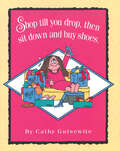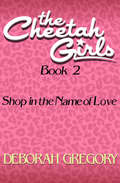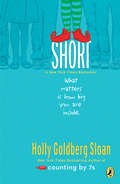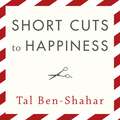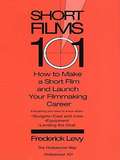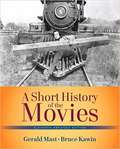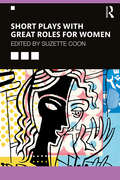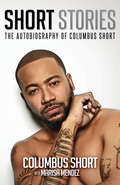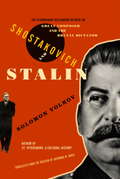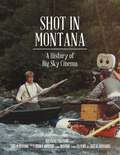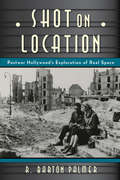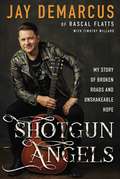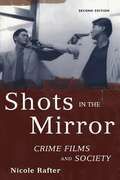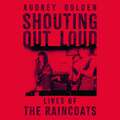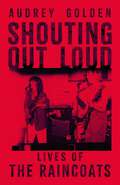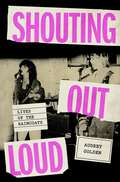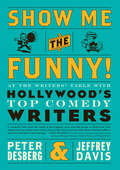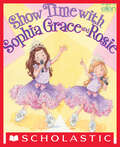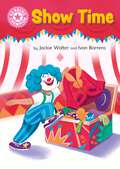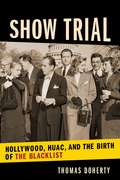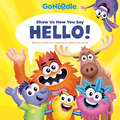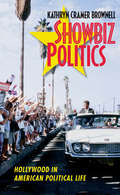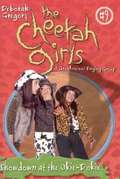- Table View
- List View
Shop Till You Drop, Then Sit Down and Buy Shoes
by Cathy GuisewiteExplore the worlds of fashion and shopping through the eyes of America’s most endearing comic strip heroine with this amusing book. Faithful Cathy readers count on their cartoon heroine to tell it like it is, whether the subject’s relationships, parental responsibilities, or shopping. In Shop Till You Drop, Then Sit Down and Buy Shoes, readers will find Cathy’s words of wisdom on the joys and woes of shopping and fashion.
Shop in the Name of Love: Shop In The Name Of Love (The Cheetah Girls #2)
by Deborah GregoryChanel doesn&’t want to wait until the Cheetah Girls strike it rich to earn enough to buy all the clothes she adores, so she starts charging on her mom&’s credit card.
Short
by Holly Goldberg Sloan<P>Julia is very short for her age, but by the end of the summer run of The Wizard of Oz, she’ll realize how big she is inside, where it counts. <P>She hasn’t ever thought of herself as a performer, but when the wonderful director of Oz casts her as a Munchkin, she begins to see herself in a new way. <P>As Julia becomes friendly with the poised and wise Olive—one of the adults with dwarfism who’ve joined the production’s motley crew of Munchkins—and with her deeply artistic neighbor, Mrs. Chang, Julia’s own sense of self as an artist grows. <P>Soon, she doesn’t want to fade into the background—and it’s a good thing, because her director has more big plans for Julia! <P>Bubbling over with humor and tenderness, this is an irresistible story of self-discovery and of the role models who forever change us. <P><b>A New York Times Bestseller</b>
Short Cuts To Happiness: How I found the meaning of life from a barber's chair
by Tal Ben-ShaharFrom the New York Times bestselling psychologist who taught us how to be happier, an intimate, keepsake collection of wisdoms he learned from a most unlikely source.Even a New York Times-bestselling happiness expert can need advice!In his trailblazing Harvard courses, internationally bestselling books, and lectures and videos, positive psychologist Tal Ben-Shahar has shared his essential, scientifically backed tools for finding fulfillment the world over. But even the happiness expert needs a boost from time to time! Tal found his not in a guru or fellow psychologist, but rather in his longtime neighborhood barber, Avi-a man with a gift for making his clients look and feel great with wisdom beyond his years.Tal's visits to Avi soon grew into a friendship deeper than most. Between snips, the two men talked about everything from family and starting a business to the meaning of life and the power of music. Two years of their revelatory barbershop talk have been distilled into these gems of inspiration-perfect to give, receive, and share, even between haircuts.'A charming read to remind you that wisdom about happiness is often right around the corner.' - Adam Grant, New York Times bestselling author of Give and Take and Originals, and co-author of Option B with Sheryl Sandberg'When a happiness expert like Ben-Shahar turns to someone else for advice, you know the advice has got to be good. Short Cuts to Happiness offers accessible, universal wisdom that puts a life of meaning and fulfilment within reach and sets a very high bar for my next trip to the barber!' - Colin Beavan, author of No Impact Man and How to Be Alive(P)2018 Tantor Audio
Short Films 101
by Frederick LevyWhere does a young filmmaker begin? With the right short-film concept and this book! The right short can be a filmmaker's "business card" in Hollywood. Here's the authoritative handbook by one of Hollywood's most connected insiders that offers a step-by-step guide through the entire creative process of shooting a short film, as well as expert advice from established filmmakers, and a final game plan for promoting and selling the film once it's in the can. Topics covered include: € Concept € Budget € Finding equipment € Assembling a crew € Casting € Arranging for location € Locating festivals and ancillary markets € Working with the unions € Film vs. digital video Plus: € A list of film schools € Oscar-winning shorts and nominees € A selection of short-film festivals € Actual short-film budgets € Sample scripts and shooting schedules € A helpful short-film glossary .
Short History of the Movies
by Bruce Kawin Gerald MastThis is the essential core of Mast and Kawin’s classic in a streamlined volume: the most accurate, carefully updated account of cinema today in a clear and lively book. <P><P>Building on Mast’s astute and lively history of cinema, Kawin has refined and updated the fascinating story of cinema’s evolution from its earliest beginnings to the digital age. Probing deeper than most movie books, he takes us into the studio vaults, corrects the record, discloses what goes on inside the industry, clarifies the mysteries of movie technology, and offers a precise, thoroughly researched account. Kawin's analysis is witty and engaging, rich in instructive insights and entertaining illustrations of the art, history, technology, business, and fun of film. Now the essentials of Mast and Kawin’s classic book are available in a compact version, judiciously streamlined at an even trimmer price.
Short Plays with Great Roles for Women
by Suzette CoonShort Plays with Great Roles for Women is an antidote to the traditional underrepresentation of women on stage, by offering twenty-two short plays that put women right at the centre of the action. The push for more women’s roles has gathered force over the last few years, and this collection is part of that movement, with rich, intelligent roles for women of all ages and backgrounds. This anthology offers a vital slice of life, addressing relevant and diverse topics such as: a young, Islamic woman coming out to her religious mother; black women’s navigation of the natural hair movement; bullying in a small-town American school; social media addiction; and the trials and tribulations of family life. Plays from award-winning playwrights are supported by original production details and playwrights’ afterwords, forming a broad and comprehensive collection of complete texts that offer full character journeys. Appealing to aspiring performers, playwrights, directors and students, Short Plays with Great Roles for Women is an essential resource for actor training, assessments, showcases, show-reels, short films and theatre performances.
Short Stories: The Autobiography of Columbus Short
by Marisa Mendez Columbus Short"An engaging account about the way unhealthy entanglements can affect an actor’s life.." - Kirkus ReviewsThe life of actor/choreographer/musician Columbus Short has been punctuated with trauma that extends well beyond the plot lines of his previous role on the hit series Scandal. Short has lived many lives packed into one-from a family filled with turmoil to tumultuous love affairs and enough scandals of his own. But somewhere in the middle, Short's realization that there has to be a better way comes into full view. "Short Stories" not only details Columbus Short's journey from childhood to Hollywood, it shows how even the most checkered of pasts can create a different person with the right amount of will and drive, especially when it comes to fulfilling your true destiny.
Shostakovich and Stalin: The Extraordinary Relationship Between the Great Composer and the Brutal Dictator
by Solomon Volkov'Music illuminates a person and provides him with his last hope; even Stalin, a butcher, knew that ...' So said the Russian composer Dmitri Shostakovich, who spent his life battling for the right to create his works under the Soviet Union's totalitarian regime. This proved dangerous under the autocratic Stalin, who perceived himself to be an erudite critic of modern culture. So when he stormed out of the performance of Shostakovich's opera 'Lady Macbeth of Mtsensk' in 1936, the composer feared he would be arrested and killed. Instead, the 'supreme leader' played a game of cat and mouse. He would attack Shostakovich in Pravda and ban his music from the airwaves. Then he would honour him with prestigious awards. Stalin's goal was to remain unpredictable, and thus afford Shostakovich no sense of personal security, although he continued to compose stirring symphonies that drew him millions of fans. This is a fascinating and important story told by one of the greatest authorities on Russian culture in the Soviet years.
Shot by Shot: A Practical Guide to Filmmaking (3rd Edition)
by Susan Howard John Cantine Brady LewisShot by Shot is an easy-to-follow guide to film-making.
Shot in Montana: A History of Big Sky Cinema
by Brian D'AmbrosioFor nearly a century, movies have been made in Montana. The state played itself in Cattle Queen of Montana, Thunderbolt and Lightfoot, Winter in the Blood, and the iconic A River Runs Through It, and it doubled for an Arctic ice pack in Firefox, Nebraska in Nebraska, the authentic Old West in Heaven&’s Gate, and even heaven in What Dreams May Come.Montana&’s Kootenai River swallowed up Academy Award-winning actress Meryl Streep in The River Wild, a stunt double for Leonardo DiCaprio tumbled down Kootenai Falls in The Revenant, and Forrest Gump ran through Glacier National Park. The city of Butte played itself in Evel Knievel, substituted for San Francisco&’s Chinatown in Thousand Pieces of Gold, and hosted a zombie apocalypse in Dead 7. Charles Bronson&’s Telefon blew up a school in Great Falls, Jack Nicholson and Marlon Brando battled in the badlands of The Missouri Breaks, and Far and Away&’s Oklahoma land rush with Tom Cruise and Nicole Kidman actually thundered across Montana prairie.From megahits with the biggest Hollywood stars to acclaimed independent films and forgettable flops, nearly a hundred movies have been made, in whole or in part, in Montana, and for the first time this treasure trove of filmmaking has been thoroughly researched and documented. Montana author Brian D&’Ambrosio (Warrior in the Ring) describes every movie, including the actors, directors, and shooting locations, and reveals fascinating stories and incidents that took place behind the cameras.Featuring 120 photos and interviews with actors and filmmakers, Shot in Montana is a blockbuster adventure through the Treasure State&’s cinematic history.
Shot on Location
by R. Barton PalmerIn the early days of filmmaking, before many of Hollywood's elaborate sets and soundstages had been built, it was common for movies to be shot on location. Decades later, Hollywood filmmakers rediscovered the practice of using real locations and documentary footage in their narrative features. Why did this happen? What caused this sudden change? Renowned film scholar R. Barton Palmer answers this question in Shot on Location by exploring the historical, ideological, economic, and technological developments that led Hollywood to head back outside in order to capture footage of real places. His groundbreaking research reveals that wartime newsreels had a massive influence on postwar Hollywood film, although there are key distinctions to be made between these movies and their closest contemporaries, Italian neorealist films. Considering how these practices were used in everything from war movies like Twelve O'Clock High to westerns like The Searchers, Palmer explores how the blurring of the formal boundaries between cinematic journalism and fiction lent a "reality effect" to otherwise implausible stories. Shot on Location describes how the period's greatest directors, from Alfred Hitchcock to Billy Wilder, increasingly moved beyond the confines of the studio. At the same time, the book acknowledges the collaborative nature of moviemaking, identifying key roles that screenwriters, art designers, location scouts, and editors played in incorporating actual geographical locales and social milieus within a fictional framework. Palmer thus offers a fascinating behind-the-scenes look at how Hollywood transformed the way we view real spaces.
Shotgun Angels: My Story of Broken Roads and Unshakeable Hope
by Jay DeMarcusMany celebrities are known to say how blessed they are, but when Rascal Flatts' Jay DeMarcus says it, the word takes on a completely different meaning. From his humble beginnings in Ohio to the spark of early fame in Nashville to a fair share of surprises and setbacks in between, he's learned firsthand that the blessing only comes through the broken road. And the only thing able to sustain a person along the way is hope.With no shortage of humor, heart, and off-the-cuff candor, Jay gives readers a backstage pass to the story behind the music and the musician. Along the way, you'll find the same constant source of strength that he has: hope that is powerful enough to hold you up through whatever twists, turns, or trials come your way.
Shots In The Mirror: Crime Films and Society (Second Edition)
by Nicole RafterMovies play a central role in shaping our understanding of crime and the world generally, helping us define what is good and bad, desirable and unworthy, lawful and illicit, strong and weak. Crime films raise controversial issues about the distribution of social power and the meanings of deviance, and they provide a safe space for fantasies of rebellion, punishment, and the restoration of order. <p><p> In the first comprehensive study of its kind, well-known criminologist Nicole Rafter examines the relationship between society and crime films from the perspectives of criminal justice, film history and technique, and sociology. Shots in the Mirror begins with an overview of the history of crime films and the emergence of various genres, surveying important films from the silent era, the early gangster films of the '30s, classic film noir, the work of Hitchcock, and recent innovations by Scorsese, Tarantino, and the Coen brothers. <p> Keeping pace with the evolution of crime films, Shots in the Mirror has been updated to respond to recent developments, trends, and shifting circumstances in the genre. This new edition expands the scope and increases the depth and variety of the previous edition by including foreign films in addition to American movies. Rafter also integrates an entirely new body of literature into the study, reflecting the rapid expansion of scholarship on law-related films over the past three years. She has added a chapter on psycho movies, a previously unrecognized subcategory of crime films. Another new chapter, "The Alternative Tradition and Films of Moral Ambiguity," focuses on recent sex crime films. This new final chapter grows organically out of the first edition's distinction between traditional crime films, with their easy solutions to social problems, and those more unusual critical films which belong to the bleaker, morally ambiguous, alternative tradition. <p> Rafter examines more than three hundred films in this study, considering what they have to say, socially and ideologically, about the causes of crime, and adding valuable contributions to the on-going debate on whether media representations of violence cause crime. Shots in the Mirror is both a marvelous history of crime films and a trenchant analysis of their complex relationship to larger society.
Shout, Sister, Shout! The untold Story of Rock-and-Roll Trailblazer Sister Rosetta Tharpe
by Gayle F. WaldBiography of African American gospel and blues singer.
Shouting Out Loud: Lives of The Raincoats
by Audrey GoldenArt students Gina Birch and Ana da Silva formed The Raincoats in 1977. Since the release of their seminal early records, the 'godmothers of grunge' have been revered by punk, queer, feminist and indie pop artists alike. The Raincoats reimagined the nature of experimental music and DIY design and went on to inspire Sonic Youth, Nirvana, and an entire generation of Riot Grrrl and queercore musicians. Shouting Out Loud: Lives of the Raincoats tells their astonishing story in three extraordinary lives. In The Raincoats' first life, they recorded three full-length albums now regarded as classics and were the first punk band to play behind the Iron Curtain in Warsaw. Nearly a decade later in 1992, the band's second life took off when Kurt Cobain's love of the band catalysed their renaissance.In 2001, The Raincoats emerged from their five-year hiatus into their third and ongoing iteration marked by performances in art museums such as New York's MoMA, the Pompidou Centre in Paris, and London's National Portrait Gallery. The Raincoats have and continue to be a singular phenomenon and influence for so many. Featuring exclusive interviews and never-before-seen images from The Raincoats' archive, Shouting Out Loud is the ultimate, authorised biography of this pioneering group of women - and the must-have account of a legendary band that holds a vital place in twentieth and twenty-first century sonic history.
Shouting Out Loud: Lives of The Raincoats
by Audrey GoldenArt students Gina Birch and Ana da Silva formed The Raincoats in 1977. Since the release of their seminal early records, the 'godmothers of grunge' have been revered by punk, queer, feminist and indie pop artists alike. The Raincoats reimagined the nature of experimental music and DIY design and went on to inspire Sonic Youth, Nirvana, and an entire generation of Riot Grrrl and queercore musicians. Shouting Out Loud: Lives of the Raincoats tells their astonishing story in three extraordinary lives. In The Raincoats' first life, they recorded three full-length albums now regarded as classics and were the first punk band to play behind the Iron Curtain in Warsaw. Nearly a decade later in 1992, the band's second life took off when Kurt Cobain's love of the band catalysed their renaissance.In 2001, The Raincoats emerged from their five-year hiatus into their third and ongoing iteration marked by performances in art museums such as New York's MoMA, the Pompidou Centre in Paris, and London's National Portrait Gallery. The Raincoats have and continue to be a singular phenomenon and influence for so many. Featuring exclusive interviews and never-before-seen images from The Raincoats' archive, Shouting Out Loud is the ultimate, authorised biography of this pioneering group of women - and the must-have account of a legendary band that holds a vital place in twentieth and twenty-first century sonic history.
Shouting Out Loud: Lives of the Raincoats
by Audrey GoldenThe first biography of legendary and influential British punk band The Raincoats, who are long revered by those in the international punk scene. The Raincoats were formed in London in 1977 as an experimental punk band synonymous with their indie label, Rough Trade. They went on to create what Vivien Goldman called &“a new legacy of punk&” and arguably became the most pioneering female band of the post-punk era while inspiring a new wave of DIY and queercore artists. Introduced by Kurt Cobain to a new generation in the 1990s, The Raincoats were invited to tour with Nirvana, and were known as the &“godmothers of grunge&” and "godmothers of Riot Grrrl" before eventually becoming label mates with Sonic Youth, Nirvana, Hole, Bikini Kill, and Elastica. In the 21st-century, The Raincoats singularly inspired Bikini Kill to reform after a 20-year hiatus. Featuring exclusive interviews and brand new photos from the Raincoats' archives, as well as reproduced ephemera, Shouting Out Loud is the first ever biography of this groundbreaking band and shows how this pioneering group of women paved the way for those that followed in their footsteps. Additionally, the book features original interviews with members of Sonic Youth, Hole, Bikini Kill, Sleater-Kinney, Big Joanie, Liz Phair, and many more. Meticulously researched and sweeping in scope, Shouting Out Loud is the must-have account of a band that became the linchpin of feminist music in the 20th century.
Show Me the Funny!: At the Writers' Table with Hollywoods Top Comedy Writers
by Jeffrey Davis Peter DesbergEnjoy a unique glimpse into the intelligent and quirky inner workings of the comedic mind! This special e-version of Show Me the Funny! presents 28 top comedy screenwriters--including three bonus interviews not in the original print book--from the revered figures of televisions “Golden Age” to todays favorite movie jokesters. Authors Desberg and Davis put an innovative spin on the traditional interview: each writer was given the same loosely structured comedic premise and asked to develop it in any way he or she wanted-no rules, no boundaries, no limits! The result is a hilarious and illuminating look at the comic process. INCLUDES:o Leonard Stern (co-creator of Get Smart) o Sherwood Schwartz (Gilligans Island, The Brady Bunch) o Peter Casey (co-creator of The Jeffersons, Cheers, Wings, Frasier) o Phil Rosenthal (co-creator of Everybody Loves Raymond) o Ed Decter (co-writer of Theres Something About Mary) o plus three e-book only interviews: Marley Simms (Home Improvement, Sabrina the Teenage Witch)Dan O’Shannon (Modern Family, Frasier, Cheers), and Charlie Hauck (Maude, Cheers)
Show Time With Sophia Grace and Rosie
by Sophia Grace Brownlee Rosie McClellandOn the heels of their NEW YORK TIMES bestselling TEA TIME WITH SOPHIA GRACE AND ROSIE, Sophia Grace and Rosie are back!TEA TIME WITH SOPHIA GRACE AND ROSIE was a NEW YORK TIMES bestseller! Cousins Sophia Grace and Rosie have charmed Ellen DeGeneres, her studio audiences, and millions of YouTube viewers with their British accents, delightful banter, princess dresses, singing and dancing talents, and more!In their second picture book, Sophia Grace and Rosie pick the perfect song for their school-wide talent show. They practice day and night. But what BIG surprise do they have in the works? Get ready for ... SHOW TIME WITH SOPHIA GRACE AND ROSIE!
Show Time: Independent Pink 1b (Reading Champion #610)
by Jackie WalterThis story is part of Reading Champion, a series carefully linked to book bands to encourage independent reading skills, developed with Dr Sue Bodman and Glen Franklin of UCL Institute of Education (IOE)Reading Champion offers independent reading books for children to practise and reinforce their developing reading skills.Fantastic, original stories are accompanied by engaging artwork and a reading activity. Each book has been carefully graded so that it can be matched to a child's reading ability, encouraging reading for pleasure.
Show Trial: Hollywood, HUAC, and the Birth of the Blacklist (Film and Culture Series)
by Thomas DohertyIn 1947, the Cold War came to Hollywood. Over nine tumultuous days in October, the House Un-American Activities Committee held a notorious round of hearings into alleged Communist subversion in the movie industry. The blowback was profound: the major studios pledged to never again employ a known Communist or unrepentant fellow traveler. The declaration marked the onset of the blacklist era, a time when political allegiances, real or suspected, determined employment opportunities in the entertainment industry. Hundreds of artists were shown the door—or had it shut in their faces.In Show Trial, Thomas Doherty takes us behind the scenes at the first full-on media-political spectacle of the postwar era. He details the theatrical elements of a proceeding that bridged the realms of entertainment and politics, a courtroom drama starring glamorous actors, colorful moguls, on-the-make congressmen, high-priced lawyers, single-minded investigators, and recalcitrant screenwriters, all recorded by newsreel cameras and broadcast over radio. Doherty tells the story of the Hollywood Ten and the other witnesses, friendly and unfriendly, who testified, and chronicles the implementation of the postwar blacklist. Show Trial is a rich, character-driven inquiry into how the HUAC hearings ignited the anti-Communist crackdown in Hollywood, providing a gripping cultural history of one of the most transformative events of the postwar era.
Show Us How You Say Hello! (GoNoodle)
by Random HouseDance, laugh and learn with this GoNoodle storybook!How do you say &‘hello&’ to people that you know? Introduce readers to some of their favorite GoNoodle characters with this new hardcover storybook based on &‘Hello&’, the popular video and song which embraces dancing, diversity, education, and good-old fashioned fun! Get up and get moving with GoNoodle!
Showbiz Politics: Hollywood in American Political Life
by Kathryn Cramer BrownellConventional wisdom holds that John F. Kennedy was the first celebrity president, in no small part because of his innate television savvy. But, as Kathryn Brownell shows, Kennedy capitalized on a tradition and style rooted in California politics and the Hollywood studio system. Since the 1920s, politicians and professional showmen have developed relationships and built organizations, institutionalizing Hollywood styles, structures, and personalities in the American political process. Brownell explores how similarities developed between the operation of a studio, planning a successful electoral campaign, and ultimately running an administration. Using their business and public relations know-how, figures such as Louis B. Mayer, Bette Davis, Jack Warner, Harry Belafonte, Ronald Reagan, and members of the Rat Pack made Hollywood connections an asset in a political world being quickly transformed by the media. Brownell takes readers behind the camera to explore the negotiations and relationships that developed between key Hollywood insiders and presidential candidates from Dwight Eisenhower to Bill Clinton, analyzing how entertainment replaced party spectacle as a strategy to raise money, win votes, and secure success for all those involved. She demonstrates how Hollywood contributed to the rise of mass-mediated politics, making the twentieth century not just the age of the political consultant, but also the age of showbiz politics.
Showdown at the Okie Dokie (Cheetah Girls #9)
by Deborah GregoryThe Cheetah Girls now have a demo tape in the works. Then they perform at a new urban rodeo, the Okie Dokie Corral, and their arch rivals, the Cash Money Girls -- CMG -- accuse Galleria and Chanel of cribbing lyrics from a CMG song. They warn the Cheetah Girls that they better bounce off the music scene -- or else.
